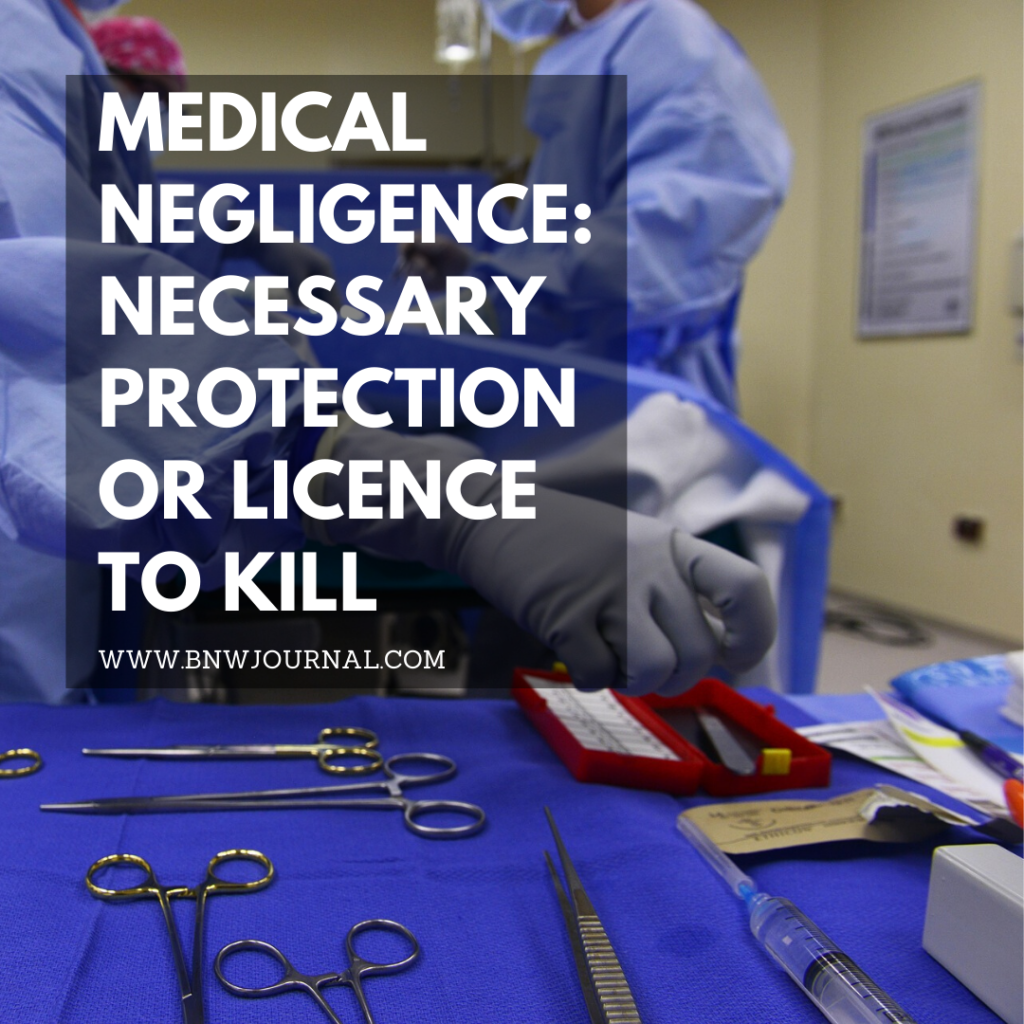![]()
Introduction
The world could not disagree on how noble the medical profession is. It is a universal expectation that the practitioners have maximum expertise as every advice of theirs would affect the potential health of their patients. And if the skill is profess without a reasonable degree and care, it would have its adversities. This possibility of any doctor besmirching the nobility that comes with their profession is increasing. Alongside increasing lawsuits against doctors for their negligence. This brings us to the issue of medical negligence.

Negligence can be defined as the omission to do something which a reasonable man would do or doing something which a prudent or reasonable man would not do[1]. The duty of a doctor is to provide care and cater to the patient’s ailment, cautiously to a reasonable threshold. In this feat, if he acts negligently, he is bound to face the consequences, legally. In this essay I would deal with what the supreme court’s stand on the issue is and whether it is justified.
Position of the Supreme Court
The Supreme Court in Jacob Mathew’s case[2] held certain guidelines that have to be undertaken before filing a suit against the doctor, suing him for negligence. The court state that the investigating officer and the aggrieve party may not necessarily know medically to determine. Whether a doctor’s act comes within the ambit of rash and negligent act under section 304-A of the Indian Penal Code. While this is true majorly. The court went on to say that the medical professional involve undergo a lot of mental agony and public harassment; for the period of the lawsuit. He seeks bail to escape being in custody, which he is not guarantee. At the end of the case, even if he is acquitted, the loss of reputation he faces is irreversible.
Hence, to ensure that a doctor is liable for the death of a patient, by the standards of criminal law; it must be establish that there was negligence or incompetence on the doctor’s part. That went beyond a mere question of compensation base on civil liability. This responsibility on the doctor would only be instilled if the doctor committed an act that led to deliberate disregard of the person’s life and safety[3].
The components of Medical Negligence could roughly be the duty of care, breach of the said duty of care. And this breach leading to significant damage. Duty of care implies that the doctor has an express duty to take care of the patient. And the doctor owes it to his patient (the defendant to the complainant). When the doctor ceases to attain that standard of care, that is warranted by law, he commits a breach. This breach should be accompanied by damage, recognized by the law. While all of these elements look theoretically workable, when practically applied fails.
Circumstantially, the doctors in cases of fatal accidents are required to use their skills to perfection and help a dying life come out of the ‘almost-death’ phase. The doctor may succumb to using crude and otherwise unnecessary forms of medical procedures in furtherance of the same. In such cases, if the patient dies, it could not be said to be due to the doctor’s negligence[4].
There is a massive misconception with respect to what amounts to medical negligence. An ‘aggrieved’ patient has readily palatable options to make the doctor liable under the Consumer Protection Act, 1986 for providing deficient services. Under the IPC alone, the claimant could initiate legal proceedings, perusing sections 304A, 337, and 338. Section 304A for causing the death of any person by doing any rash or negligent act. Which does not amount to culpable homicide, punishable with imprisonment for 2 years. Section 337 for causing hurt to any person by doing any rash or negligent act would endanger human life. Section 338 for causing grievous hurt to any person by doing any rash or negligent act to endanger human life.
There is an eclectic range of options available for the claimant to make justice available. However, owing to the hike in malicious prosecutions that endangers the reputation of the medical professionals. The Supreme Court has establish guidelines for what constitutes an actionable negligence. This is for the simple reason that in the case of the doctor is innocent. He should not have undergone any damage to his image. Which cannot otherwise be measure in monetary terms. Hence, every medical negligence case comes with certain responsibilities and duties on the part of the claimant too It is to establish a cogent case.
Threshold for actionable negligence[5]
Cases of medical negligence are running into thousands and in many cases, they are frivolous. To keep up the sanctity of the profession and to prevent the potential loss of reputation. There is a necessity to put the onus of proof on the complainant in the case of medical negligence. The court went on to define what could amount to actionable negligence. A simple lack of care, an error of judgment, or an accident, even fatal, will not constitute culpable medical negligence. Had the doctor follow the procedures as recognize by the law at the time of the committing of the act, he cannot be penalized. He cannot be sued for not taking a better alternative or not being a highly skilled doctor. This sounds fair to the extent that the doctor followed the relevant procedure. [6]
Second, Professionals may certainly be held liable for negligence if they were not possess of the requisite skill which they claimed. If they did not exercise, with reasonable competence, the skill which they did possess. This dishonesty would amount to criminal culpability as a doctor who claims to be a cosmetic surgeon by educational qualification. If he could not practice a liposuction to the reasonable competence. Leading to the death of the patient, it would be negligence.
Third, The word ‘gross’ has not been use in Section 304A of IPC. The proof of gross negligence for assessing whether a defendant is guilty. It should be look into irrespective of this absence of the mention. Next, like, in most criminal cases the burden of proof must lie on the complainant. The principle of res ipsa loquitur does not hold good. All medical negligence cases concern various questions of fact. When we say the burden of proving negligence lies on the Complainant. It means he has the task of convincing the court that his version of the facts is the correct one.[7]
This becomes important as until there is a reasonable standard of proof that convinces the court. The doctors cannot be held liable. Also, if the doctors are to give proof to disprove their actions, it might even lead to self-incrimination. Guidelines governing the prosecution of doctors need to be frame and issue by the State and Central governments. It is in consultation with the Medical Council of India (MCI). Until this is done, private complaints must be accompany by the credible opinion of another competent doctor. That he supporting the charge of rashness or negligence. Expert opinion plays an important part in determining the guilt of the doctor.[8]
Finally, doctors who have accusations of rashness or negligence leveled against them may not be arrested simply because charges have been leveled against them; this may be done only if it is necessary for furthering the investigation, or for collecting evidence, or if the investigating officer fears that the accused will abscond. This point is of the most controversy as the doctors are treat as a special class of citizens. In an argument, I believe this is important as unlike other crimes which harm the alleged personal reputation of the accused, the doctor’s professional capacity to continue being a doctor will be questioned by the general public if he is arrested just based on the complaint of the claimant. However, this does not dismiss arresting in totality. If in the judgment of the investigating officer, the accused may abscond, he may take reasonable precaution and keep the accused in custody.
The Supreme Court[9] has highlighted that the difference between civil and criminal liability is that in civil liability, the decision is influenced by the damage that can be quantified. And in criminal cases, the amount and the degree of negligence is the main factor that decides the culpability of a practitioner. Moreover, the motive of the offense, magnitude of the offense and the character of the offender must be accompanied within the case of establishing proof.
Addressing the question of deprivation of Right to Life
The stance of the Supreme Court received major backlash on the grounds that the guidelines lead to an express absolvement of the medical practitioners and depriving the aggrieved party of his right to health, dignity and justice, and life, in toto. Providing adequate medical facilities is an essential part of the obligation undertake by the State in a welfare state. The Government discharges this obligation by running hospitals and health centers. Article 21 imposes an obligation on the State to safeguard the right to life of every person[10].
While I am all for upholding the right to life of the citizens, there lies a miscalculation around how the guidelines obstruct the claimant’s path to justice. Here, it is equally important to look at the rights of the doctor within the legal ambit, he has the right to reputation. Strengthening the guidelines in lieu of protecting a possibly innocent defendant, in case of him being a doctor is what sets him apart from the rest of the accused persons.
Moreover, if the proof is of reasonable standards, the court isgoing to hold the doctor liable. A landmark example could be the case of Anuradha Saha[11] , which to date seems to be a ‘deterrent and a reminder’ to the medical community where it ordered a compensation of Rs.5.96 crore and an interest exceeding Rs. 11 crores. This is a testament to the fact that with reasonable proof. No claimant will be left unheard and the doctors will not left free at the hands of the law.
Conclusion
No judicial decision would curb a justice seeker’s path with undue decrees. So, is the case of instituting guidelines in filing Medical Negligence. In the absence of these, the number of cases would pile up burdening the judiciary. Moreover, I also believe that these guidelines do not prevent any aggrieved from getting justice because under no implication has the Supreme Court said that the doctors are completely immune to prosecution. It simply only puts forth the need for precaution before declaring a doctor guilty considering his stature and in the interests of the society. An extra insulation to their community must be award to wade off the evil of malicious prosecutions. Hence, by all means, stand take by the Supreme Court is a necessary protection.
References:
[1] Blyth vs. Birmingham waterworks co., (1856) 11 Ex Ch 781 (United Kingdom).
[2] Jacob Mathews vs. State of Punjab, AIR 2005 SC 3180 (India).
[3] BV Subrahmanyam, “Jacob Mathew v. State of Punjab, the judgment stipulates the guidelines to be followed before launching a prosecution against a doctor for negligence” 4 J Neurosci Rural Pract. (2013)
[4] MS Pandit and Shobha Pandit, “Medical negligence: Coverage of the profession, duties, ethics, case law, and enlightened defense – A legal perspective” 25 Indian J Urol. (2009)
[5] SUBRAHMANYAM BV, MEDICAL JURISPRUDENCE AND TOXICOLOGY 651-75 (2011)
[6] MR Harihara Nair, “Supreme Court judgement on criminal medical negligence: a challenge to the profession” 2 IJME (2005).
[7] Dr. Laxman Balkrishna vs. Dr. Triambak, AIR. 1969 SC 128 (India).
[8] Sethuraman Subramaniam Iyer vs. Triveni Nursing Home, 1997(2)C.P.C.405 (India).
[9] State of Haryana vs Santra AIR 2000 SC 3355 (India).
[10] Paschim Banga Khet Mazdoor Samiti vs.State of W.B, AIR 1996 SC 2426 (India).
[11] Balaram Prasad vs. Kunal Saha, IV 2013 ACC 378 SC (India).



1 Comment
Nevin · 12/05/2020 at 1:59 PM
Such a well written article!